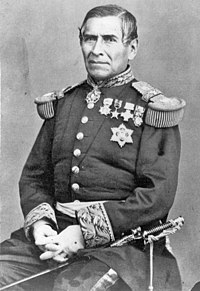Juan Almonte
| Juan Nepomuceno Almonte | |
|---|---|
 |
|
| President of the Regency of Mexico | |
|
In office 11 July 1863 – 10 April 1864 |
|
| Preceded by | Agustín de Iturbide |
| Succeeded by | Monarchy abolished |
|
Regent of the Mexican Empire with José Salas and Antonio de Labastida |
|
|
In office 11 July 1863 – 10 April 1864 |
|
| Monarch | Maximilian I of Mexico |
| Succeeded by | Maximilian I of Mexico |
| Personal details | |
| Born | May 13, 1803 Michoacán, Mexico |
| Died | March 21, 1869 (aged 65) Paris, France |
| Nationality | Mexican |
| Political party | Conservative |
| Spouse(s) | María Dolores Quesada |
| Children | María de Guadalupe Almonte |
| Occupation | Military officer, diplomat |
| Religion | Roman Catholic |
| Military service | |
| Allegiance | Mexican conservatives |
| Rank | General |
| Battles/wars | Battle of the Alamo, Texas Revolution; Mexican-American War; War of Reform |
Juan Nepomuceno Almonte (May 15, 1803 – March 21, 1869) was a 19th-century Mexican official, soldier and diplomat. He was a veteran of the Battle of the Alamo during the Texas Revolution. Almonte was also a leader of Mexico's Conservatives in the 1860s and served as regent after the Second Mexican Empire was established by Napoleon III of France.
Almonte was born in Nocupétaro, Carácuaro district, in the state of Michoacán. He was the son of José María Morelos, a Roman Catholic priest who led the insurgents in the Mexican War of Independence from 1811 to 1815, and Brígida Almonte. His mother, Brígida Almonte, was said to be of pure Amerindian ancestry. In 1815 Morelos sent Almonte to New Orleans, Louisiana, where he was educated and learned fluent English. At his trial, Morelos was accused by the Mexican Inquisition following his capture that he had sent his son there to learn the doctrines of "heretical maxims of Protestantism," to which Morelos responded he sent his son there because of his concern about his son's safety in Mexico. While in New Orleans, Almonte worked as a clerk for hardware merchant Puech & Bein. His time in the United States was cut short when his father was executed on December 22, 1815 in the village of San Cristóbal Ecatepec.
Between 1822 and 1824, Almonte was on the staff of insurgent rebel leader José Félix Trespalacios in Texas and then was sent as a part of the Mexican delegation to London. Almonte assisted Ambassador José Mariano Michelena in negotiating a commercial and amity treaty with England. This was Mexico's first treaty as a new nation. In 1830, while serving in Mexican Congress, Almonte became an object of government attention as editor of "El Atleta". He accused President Anastasio Bustamante of allowing foreign intervention in national affairs. Because of his stance, Almonte's arrest was ordered on April 16, 1830. He was forced to seek refuge in New Orleans due to government pressure, and the paper collapsed due to heavy fines levied by Bustamante’s government. Later, Bustamante relented and appointed Almonte secretary of the Mexican Legation Extraordinary in 1831. His new job was to represent Mexico in the Republics of South America and the Empire of Brazil. Almonte married María Dolores Quesada on March 1, 1840 in Mexico City and they had a daughter named María de Guadalupe Anastacia Aleja Brígida Saturnina.
...
Wikipedia
